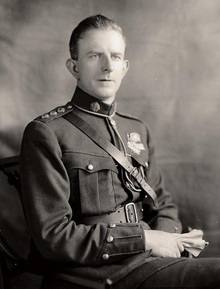Eoin O'Duffy
General Eoin O'Duffy ( Irish Eoin Ó Dubhthaigh , born October 20, 1892 in County Monaghan , † November 30, 1944 in Dublin ) was a member of the Dáil Éireann , the lower chamber of the Irish Parliament, leader of the Irish Republican Army , authorized representative of the Garda Síochána , leader of the Army Comrades Association , first party leader of the Fine Gael and finally commander of the Irish brigade that fought on the Spanish national side for a total of six months in the Spanish Civil War in 1937. He once called himself the "third most important person in Europe" after the fascist dictators Adolf Hitler and Benito Mussolini .
Life
Eoin O'Duffy was born as Owen O'Duffy in Lough Egish near Castleblayney in County Monaghan. He trained as an engineer in Wexford and then worked as an engineer and architect in Monaghan . He was also a senior member of the Gaelic Athletic Association in Ulster .
War of Independence
As early as 1917 O'Duffy joined the Irish Republican Army and took an active part in the Irish War of Independence . In February 1920 he was involved in the occupation of a barracks of the Royal Irish Constabulary by the IRA in Ballytrain near his home. Although he was captured a number of times, he was promoted to director of the IRA Army in 1921. But already in May of the same year he moved to the Parliament of the Republic of Ireland as an envoy from his home region . But in January 1922 he again replaced Richard Mulcahy at the head of the IRA. At that time he was the youngest man in Europe to be promoted to general. A few years later, however, he had to cede this honor to Francisco Franco .
Irish Civil War
In 1921, O'Duffy supported the Anglo-Irish Treaty , which provided for the creation of an Irish Free State with constitutional ties to Great Britain . In the Irish Civil War , which was fought between supporters and opponents of the treaty, O'Duffy fought on the side of the regular Irish troops . He captured the city of Limerick in July 1922, but was then stopped at the Battle of Kilmallock south of the city.
Police officer
After the creation of the Irish Free State in 1922, O'Duffy was appointed agent for the Garda Síochána , the Irish national police . The general received much credit for creating a widely respected and apolitical police force.
After the change of government as a result of the Irish elections in 1933, he was dismissed from his post by Prime Minister Éamon de Valera . This was officially justified by the fact that O'Duffy could not appear neutral towards the new government due to the conflict in the Irish civil war. It is believed, however, that this decision was also related to the fact that O'Duffy is said to have urged then Prime Minister William Thomas Cosgrave a year earlier to stay in power by military means. O'Duffy was offered a similar public service position, but turned it down.
The Irish politician Ernest Blythe , who was involved in the previous government, later announced that O'Duffy would have lost his job even without the change of government, as the previously incumbent government was also alarmed by O'Duffy's coup plans.
Blueshirts and Fine Gael
After retiring from the police force, O'Duffy took over the leadership of the Army Comrades Association ( Blueshirts ) and renamed it the National Guard (National Guard). In 1933 the organization was banned. In response to the ban, the National Center Party and Cumann na nGaedheal merged into a new political party and on September 3, 1933, Fine Gael was formed. O'Duffy became its first president. The former National Guard was renamed the Young Ireland Association ( Cumann Óige na hÉireann ) and became the party's youth wing. In September 1934, however, he was urged to resign at the one-year party meeting because he turned out to be a weak leader of the new party. He was succeeded by William Thomas Cosgrave.
Greenshirts
Even with the blueshirts, O'Duffy turned increasingly to fascist ideas and symbols. In 1935 he founded the clearly fascist National Corporate Party (NCP, Páirtí Náisiúnta Corparáidíoch ), whose members were called Greenshirts . However, only a few of the former blueshirts followed her. The NCP quickly went under after O'Duffy's return from the Spanish Civil War and his decision to retire from politics.
Irish Brigade
On an initiative of Cardinal Joseph MacRory , the Irish Brigade was founded by O'Duffy. Immediately after the beginning of the Spanish Civil War, volunteers were recruited in Ireland. Between November 1936 and January 1937 around 700 volunteers were shipped to Spain. Due to the threat of the Irish government to revoke the members of the brigade of Irish citizenship, the brigade was disbanded on the orders of Franco in June 1937 and shipped back to Ireland.
Works
- Crusade in Spain . London 1938
literature
- Volker Beismann: We did our duty, we went to Spain . Irish volunteers for Franco. In: The other Mohler. Reading book for a self-thinker. Armin Mohler's 75th birthday . San Casciano, Limburg 1995
- Fearghal McGarry: Eoin O'Duffy: A Self-Made Hero . Oxford University Press, Oxford 2008
| personal data | |
|---|---|
| SURNAME | O'Duffy, Eoin |
| BRIEF DESCRIPTION | Irish politician and military |
| DATE OF BIRTH | October 20, 1892 |
| PLACE OF BIRTH | at Castleblayney , County Monaghan |
| DATE OF DEATH | November 30, 1944 |
| Place of death | Dublin |
